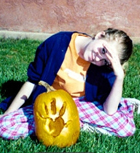A Serious Misdiagnosis Corrected at Phoenix Children’s
Not Your Typical Sinus Infection

While on vacation in Northern Utah, 12-year-old Ashley came down with a sinus infection. She had a long history of sinus infections, roughly one a month since she was born. However, this particular one took a turn for the worse. Flu-like symptoms began, and a pediatrician in Northern Utah diagnosed it as the flu. Her condition only continued to worsen, and she saw two more pediatricians while she was still there. On June 29th, Ashley traveled home to Big Water, UT, located along the Arizona border.
Among the symptoms she was experiencing upon her return home was weight loss, high fever, emotional aggression and she was repeating things. Ashley's face started getting really pale, and her eyelids, very dark.
July 5th, Ashley woke up disoriented. Memory loss began and though she knew she was in her bedroom, she did not remember coming home. She got out of bed find her mom, but was too weak to walk as paralysis began to set in on the left side of Ashley's body.
She was rushed by family members to their family physician who was very familiar with Ashley’s medical history and reoccurring sinus infections. He shined a light in her eyes, determining she was experiencing light sensitivity. It was a sure sign (in his mind) there was something going on with her brain. He took her to an emergency room for CAT scans. And while the scans were underway, a life-flight helicopter was arranged to take her to Phoenix Children’s - nearly 300 miles away.
When Ashley and her family arrived in Phoenix, they had her medical records in hand. There was bleeding on both sides of her brain, swelling and mid-line shift. Even after analysis, doctors were unable to determine a diagnosis. Twenty doctors were brought in to collaborate.
Diagnosing Ashley’s Condition
Hours later, the team came up with three possibilities for her diagnosis: a brain tumor, brain cancer or viral encephalitis. It was an intern, studying from New York, who recognized and confirmed it was viral encephalitis.
Viral encephalitis is swelling of the brain caused by a specific virus(es). Now the next step was for the doctors to diagnose the specific virus causing the encephalitis. The next day Ashley had a brain biopsy. Ten pieces of brain tissue were removed from the right side of her head for testing. The biopsy results confirmed the Herpes Simplex Virus, or HSV-1, was causing the problem.
The virus inside Ashley's brain was so far along, and had done enough damage; the doctors were surprised she was alive when they arrived. Infectious disease experts at the Hospital said she'd have a 25% chance of survival. Even if she did survive, Ashley would most likely be in the Hospital recovering for six weeks and then be in therapy until December - a very long time to be away from family and friends back home. There were also concerns she could have severe mental disabilities and be paralyzed on the left side of her body.
With this diagnosis confirmed, medications and rest would be the best remedies to fight the virus and help Ashley recover. And, against all odds, she recovered and was released from the Hospital three weeks later.
Uncovering the Causes
The HSV-1 virus lives behind the ear, where it remains dormant only causing the occasional cold sore. Most people are born with it. The doctors from the Barrow Neurological Institute at Phoenix Children's successfully determined while her immune system was fighting the sinus infection in Northern Utah, the HSV traveled into her nervous system and attacked the brain.
The odds of this happening was even more amazing - only one in every two million people contract this condition.
While at the Hospital, Ashley had numerous blood tests. One of them finally uncovered the source of the sinus problems she had experienced in her childhood. The results revealed she was very low in Gamma A, the white blood cell that protects the upper respiratory system. While her immune system was distracted and weak from fighting the sinus infection, the virus was able to get into nerve pathways and replicate it’s way to the brain essentially undetected by her immune system
Ashley Today
Now approaching 18, Ashley is pretty healthy and has her whole life ahead of her. She does not have much memory of life before the injury. While she still does struggle with a few disabilities, she graduated high school at age 16 and attended college.
Ashley enjoys a lot of hobbies, including writing, playing piano, running small businesses, crocheting, cooking, cleaning, sewing, taking long walks, photography, driving, swimming, hiking, kayaking and fishing.
She is a passionate, ambitious young woman currently considering pursuing a career in either Music Therapy for Children, or becoming a Child Life Specialist. She is open to wherever her life may take her because as her injury taught her, you cannot plan for the unexpected. Her biggest goal is to become a mom.
“Thank you, Phoenix Children’s." Ashely said. "Being able to simply breathe, live my life and be myself is a gift. A gift that I am thankful for each day I awake because of you."
